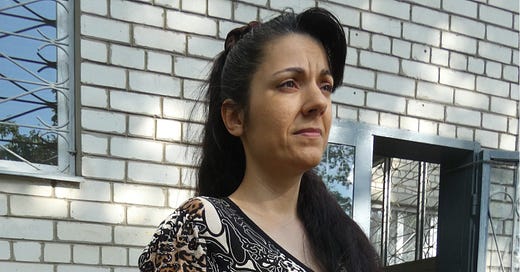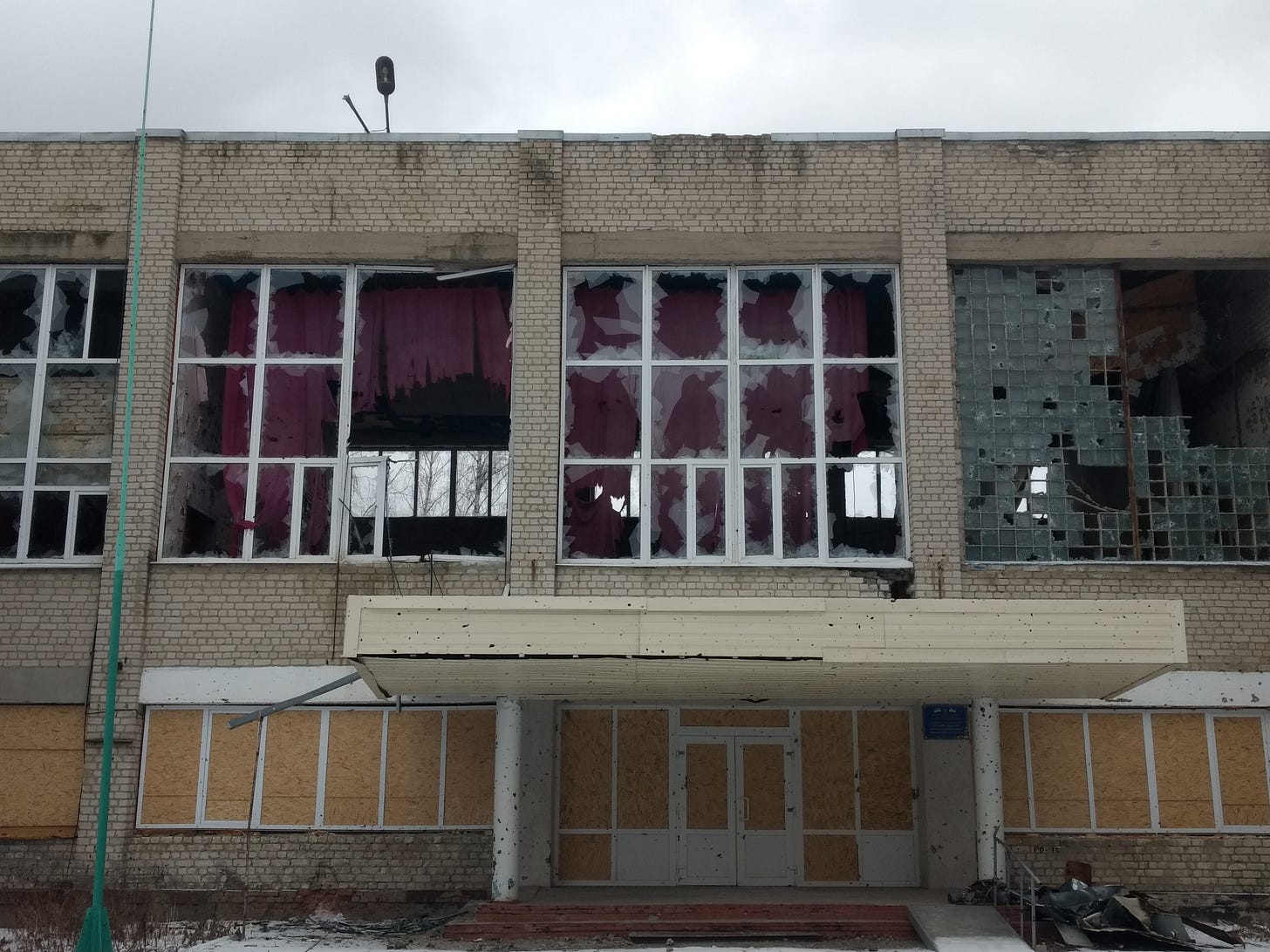Teaching freedom
An educator's quiet courage exposes the architects of autocracy in Russia and America as the weakest of minds
Julia Virich stands outside an emergency shelter for evacuees in the city of Kharkiv. She and her mother and brother fled their village of Yurchenkove after Russian forces launched a renewed offensive in northeastern Ukraine last spring. (c. Martin Kuz)
The Russians entered Julia Virich’s village only hours after launching a full-scale invasion of Ukraine on a cold February morning three years ago. Enemy troops swept down from the border 10 miles north, and facing little resistance, they soon seized Yurchenkove, where she taught English at the elementary and middle school and cared for her aging parents.
The occupiers limited the movement of residents in and out of the settlement for the next seven months. The restrictions prevented Julia from taking her father to the city of Kharkiv, a 90-minute drive away, to continue treatment for a chronic heart ailment. His condition worsened over time, and before Ukrainian forces liberated the area that fall, he had succumbed, one of the war’s thousands of uncounted casualties.
Yurchenkove’s population of 400 plunged by half in the invasion’s first weeks as people abandoned their homes, slipping away at night or concocting ruses to pass through checkpoints. After the Russian retreat, village life slowly regained its rhythm as some residents returned, willing to endure occasional artillery strikes in the area and the nightly roar of missiles arcing toward Kharkiv.
The classroom offered Julia, 39, refuge from sorrow and uncertainty. She shared her love of English-language literature with her students, introducing them to The Adventures of Tom Sawyer, The Hobbit and the Harry Potter series. The words and worlds of Twain, Tolkien and Rowling calmed her mind, warmed her spirit. “Books have always saved me,” she said. “When I’m happy, when I’m sad, when there’s war — I read.”
I met Julia in Kharkiv soon after the Russians launched a renewed offensive in northeastern Ukraine last spring. She had fled Yurchenkove with her mother and brother, both of whom are blind. Twenty months had passed since the invaders withdrew, enough time for the shadow of fear to recede. Heavy Russian shelling shattered the illusion of peace, and as fighting intensified, the family joined an exodus of 14,000 people from cities and settlements near the border.
The trio moved into one of the dozens of university dormitories in Kharkiv that the city has converted into emergency shelters during the invasion. They had escaped with only clothes, family photos and personal documents. “Before the war, I thought Russians were normal people. After all this, I see them not only as strange but as terrible creatures,” Julia said. “They want to take your freedom. And if they can’t take your freedom, they want to destroy you.”
The loss of her book collection and classroom deepened the grief of leaving behind her home and village. As an educator, Julia sought to acquaint young minds with new realms, providing her students a chance to encounter and consider unfamiliar ideas, people, cultures. “I want to try to help them think differently,” she said, speaking flawless English. “Teaching is a way to help children explore.”
An elementary and middle school in the town of Staryi Saltiv in northeastern Ukraine was destroyed by a missile strike in the war’s first weeks. (c. Martin Kuz)
The concept of education as an opportunity to expand perspectives and nurture curiosity — rather than to impose a mindless, reflexive obedience — has come under siege in the United States. Earlier this month, Stephen Miller, the deputy chief of staff to President Donald Trump, laid bare the administration’s Orwellian plans for the American classroom. Possessed of a cadaver’s gray mien and an executioner’s black heart, Miller described a campaign of forced academic compliance, sounding as if he had translated his remarks from the original Russian.
“Children will be taught to love America. Children will be taught to be patriots. Children will be taught civic values, for schools that want federal taxpayer funding,” he said. “So as we close the Department of Education and provide funding to states, we’re going to make sure these funds are not being used to promote communist ideology. For any nation to be successful, it cannot teach its children to hate themselves and to hate their country.”
Miller’s reference to communist ideology lent inadvertent irony to his call to brainwash students with state-sanctioned “patriotism.” In the 1930s, Joseph Stalin, ruler of the Soviet Union and the world’s foremost purveyor of communist ideology, aimed to extinguish Ukraine’s desire for cultural and political freedom through a broad policy of Russification. In schools, he banned Ukrainian-language grammar books, textbooks and literature and required teachers and students to speak and write in Russian, attempting to cultivate from childhood a servile devotion to Moscow and the Soviet empire.
A century later, the Kremlin remains a global leader in conformist indoctrination. Russian dictator Vladimir Putin rolled out compulsory patriotic education classes in schools nationwide near the start of his full-scale invasion. The courses glorify Russia’s military past, portray the country as a victim of Western aggression and rationalize his specious claim to Ukraine. New history textbooks liken his war to the Soviet struggle against the Nazis, and a growing network of war camps and military education centers seek to instill nationalist fervor in Russia’s youth.
Putin’s crusade to construct an alternate reality extends to Russian-controlled areas of Ukraine, where his war machine has trapped an estimated 1 million Ukrainian children. (Moscow’s forces have abducted at least 19,000 Ukrainian children over the past three years and taken them to Russia for “re-education.”) In a disturbing echo of the Stalin era, occupying authorities have replaced Ukrainian education with Russia’s official curriculum, forcing students to learn in the Russian language and denouncing their homeland as a “neo-Nazi state.”
Miller’s assertion that American schools are teaching children “to hate their country” borrows the Kremlin tactic of vilifying those who dare to resist autocracy — or who simply encourage people of any age to think for themselves. Beneath the undemocratic rhetoric in Washington and Moscow lies the same authoritarian intent: “They want to take your freedom. And if they can’t take your freedom, they want to destroy you.”
Russian forces occupy territory a short distance from Yurchenkove, and the village and surrounding settlements continue to absorb artillery and mortar fire. Julia has accepted that she might never again glimpse her home or her classroom sanctuary. She refuses to indulge in self-pity.
I asked how she copes. She quoted Queen frontman Freddie Mercury, who near the end of his life in 1991 gathered with his bandmates to record a final album. They could tell from his gaunt appearance that the ravages of AIDS had left him with little time. “We will not dwell on it,” he told them, “and we will go on.”
Julia has turned to teaching English online to Ukrainian refugees living abroad. She will go on, defying the fascists who prey on freedom, clutching tight to the values and the country she loves. In her quiet courage, she exposes Putin and Miller as the weakest of men, the weakest of minds.
Etc.
— A Russian drone strike on a civilian shuttle bus killed nine people in the northeastern town of Bilopillia on Saturday morning. The attack occurred hours after Russian and Ukrainian officials met in Turkey for their first face-to-face talks about the war in three years and showed yet again Putin’s lack of interest in peace. An illuminating New York Times piece delved into why he prefers war despite the high number of Russian military casualties.
— In a recent opinion essay, Bridget Brink, the former U.S. ambassador to Ukraine, explained her decision to resign last month. “I cannot stand by while a country is invaded, a democracy bombarded and children killed with impunity,” she wrote. “I believe that the only way to secure U.S. interests is to stand up for democracies and to stand against autocrats. Peace at any price is not peace at all — it is appeasement.” Bear that in mind as Trump and Putin prepare to talk on Monday about a ceasefire proposal.
— My sincere thanks for reading. Please share Reporting on Ukraine with anyone you know with an interest in the country, and if you’re a free subscriber and you like what you see, I hope you’ll consider upgrading to paid. You can also support my self-funded reporting here. Thank you.






Your description of the odious Stephen Miller deserves kudos—and the description of this young teacher’s courage is inspiring. At the rate things are going, it’s a sure bet that the Ukrainian population will be smarter and better educated than America’s citizens in a matter of years. Our lack of critical thinking and our utter ignorance as a population have landed us where we are today. Social media is undoubtedly a contributor, but rank laziness is perhaps the bigger culprit. Thank you so much for keeping the focus on how the people of Ukraine continue so valiantly to struggle.
Great points, Margaret. I am pretty sure Ukrainians already are smarter.